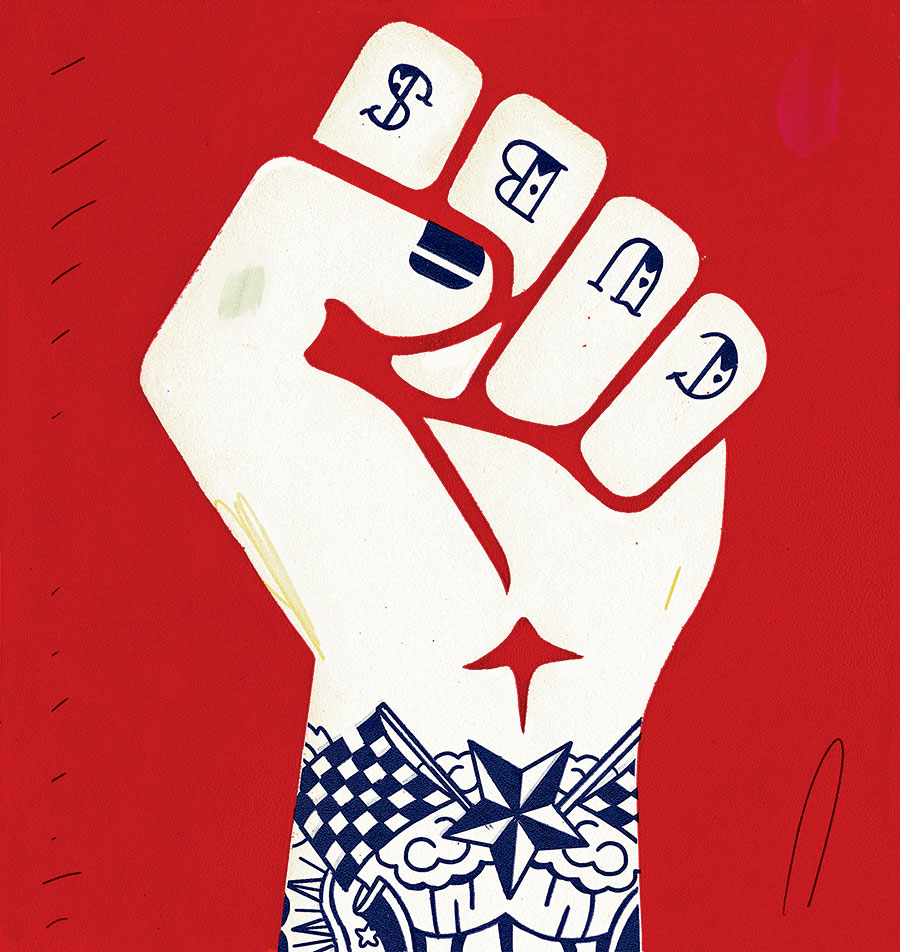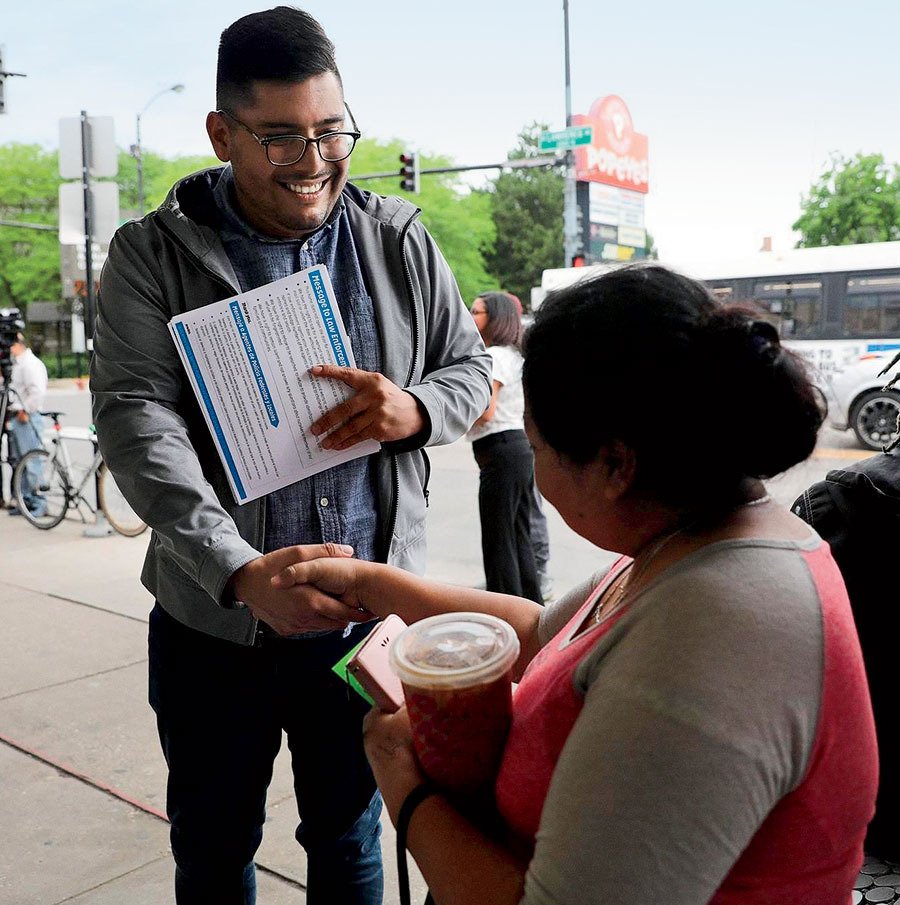
Andre Vasquez doesn’t look like anyone who’s ever set foot on the City Council floor. Over the summer, the freshman alderman held an open house in his 40th Ward office, a former dry cleaner whose windows are now adorned with a gay pride flag and a Black Lives Matter poster. Vasquez’s arms were covered with tattoos. He wore a “No Human Being Is Illegal” T-shirt and a City of Chicago baseball cap.
Vasquez doesn’t think like many other aldermen, either. He’s one of six democratic socialists who took office this year, giving the Chicago City Council the largest socialist contingent of any major city in the United States — and its first socialist bloc since the early 20th century. Vasquez’s story, and the story of how socialism gained a foothold in Chicago politics, is a story of changing generational attitudes and of a reaction to two trends — fiscal austerity and gentrification — that have been gaining strength here over the past decade.
The 40-year-old Vasquez, a former battle rapper and a son of Guatemalan immigrants, first got involved in politics in 2016 as a volunteer for Bernie Sanders, the socialist senator from Vermont who was seeking the Democratic Party’s nomination. Shortly thereafter, he joined the Chicago chapter of the Democratic Socialists of America, which exploded in size, to 1,500, partly as a result of Sanders’s campaign. This year, Vasquez was one of two socialists challenging Patrick O’Connor, a nine-term alderman and Mayor Rahm Emanuel’s floor leader. Before the election, O’Connor publicly wondered, “Who ever thought you’d be able to say, ‘I’m a democratic socialist,’ and people would say, ‘That’s a good thing’?”
To Vasquez and his peers, who came of age during the Great Recession and struggle to pay high rents and student loans with low-wage jobs, socialism has a different connotation than it does to baby boomers who grew up during the Cold War. The modern American definition is closer to what’s practiced in the welfare states of Scandinavia than in the autocracies of Cuba and Venezuela. The council’s democratic socialists accept the existence of a free market, while seeking to reduce the inequities it creates.
“A democratic socialist is like a New Deal Democrat,” says Vasquez. “We see the influence of corporations and large money in our political system. We need to have legislation that makes sure that those who have those millions and billions are paying their fair share, and that with these funds, through taxation, we’re going to be able to provide for a larger social good.”
Among the proposals promoted by Vasquez and his fellow socialists: a 1.2 percent real estate transfer tax on sales of over $1 million, earmarked for homeless services, and a requirement that developers build up to 30 percent of their units as affordable housing, depending on how likely a neighborhood is to gentrify. Democratic socialists also favor lifting the state’s ban on rent control.
That agenda helps explain why socialists were so successful on the Near Northwest Side, where rents are rising rapidly. Housing availability and affordability was one of the big issues in the 40th Ward, particularly among young apartment dwellers, who are the democratic socialists’ base, says Maggie O’Keefe, who ran against Vasquez for alderman (and is now running for ward committeeman). Besides Vasquez, Daniel La Spata won in the 1st Ward, Rossana Rodriguez-Sanchez won in the 33rd, and the council’s original socialist, Carlos Ramirez-Rosa, was reelected in the 35th. (On the South Side, Byron Sigcho-Lopez won the 25th Ward, which includes gentrifying Pilsen, and Jeanette Taylor won the 20th, where residents are concerned that the Obama Center will make area housing unaffordable.)
Chicago’s socialist movement is a response to trends both national and local. Nationally, income distribution is at its most unequal since before the Great Depression. The socialists’ solutions to inequality are not so different from Franklin D. Roosevelt’s, points out former 47th Ward alderman Ameya Pawar. “The stuff that they’re talking about reflects the fact that more and more people are living check to check. Public investment in childcare and housing, universal health care — that is the rational response to people living on the brink.”
Locally, the socialist wavelet is a backlash to the privatization and neighborhood disinvestment practiced by mayors Richard M. Daley and Rahm Emanuel. Robin Peterson, cochair of the Chicago Democratic Socialists of America, called this year’s elections “a referendum on Rahm,” which can be traced back to the Chicago Teachers Union strike and the 50 school closings during Emanuel’s first term. The radicalized teachers’ union helped found United Working Families, a left-wing political action committee that endorsed three of the socialist aldermen — including Taylor, who in 2015 went on a hunger strike to keep Dyett High School open.
The socialists are already nudging Chicago politics to the left. At a July council meeting, socialist aldermen led a call for a feasibility study on a city takeover of the power grid now operated by Commonwealth Edison. It would be “the reverse of the parking meter deal,” says Vasquez: The city would take control of a municipal asset and use it to create a public revenue stream. The proposal attracted the support of 22 aldermen, demonstrating that even a small contingent of socialists can influence the city’s agenda. “Think about the way that [U.S. representative] Alexandria Ocasio-Cortez has totally transformed the political discussion in a very short time,” says Micah Uetricht, the Chicago-based managing editor of the socialist magazine Jacobin. “That ability to reshape the political conversation is one they possess.”
Will a tattooed ex-rapper have that kind of sway? We’ll see.
Socialist Studies

This isn’t the first time socialists have sat on the Chicago City Council. In the 1870s, the Socialist Labor Party, created in response to the labor violence of the Gilded Age, elected five aldermen. The movement was suppressed after the 1886 Haymarket Square bombing, but at the turn of the 20th century, the Socialist Party of America emerged. In 1917, three Socialist aldermen sat on the council, using their positions to oppose U.S. participation in World War I. When Alderman John C. Kennedy spoke out against a resolution granting city employees time off to register for the draft, one of his colleagues taunted, “Why don’t you bring a red flag to the Council?” The party’s popularity declined as a result of the postwar Red Scare. In 1919, the last Socialist alderman, former Pullman electrician Charles V. Johnson, was defeated in what the Tribune called a “Hard Blow to Bolsheviki.” It would be nearly a century before socialism returned to City Hall, with the 2015 election of Chicago DSA member Carlos Ramirez-Rosa.



